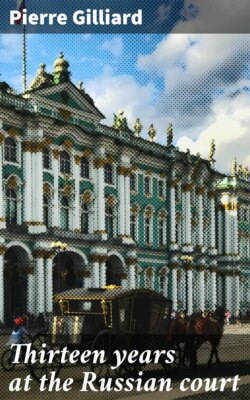Читать книгу Thirteen years at the Russian court - Pierre Gilliard - Страница 6
На сайте Литреса книга снята с продажи.
CHAPTER II
ALEXIS NICOLAÏEVITCH—VISITS TO THE CRIMEA
(AUTUMN, 1911, AND SPRING, 1912)
SPALA (AUTUMN, 1912)
ОглавлениеTable of Contents
THE Imperial family used regularly to spend the winter at Tsarskoïe-Selo, a pretty little country town some thirteen miles south of Petrograd. It stands on a hill at the top of which is the Great Palace, a favourite residence of Catherine II. Not far away is a much more modest building, the Alexander Palace, half hidden in trees of a park studded with little artificial lakes. The Czar Nicholas II. had made it one of his regular residences ever since the tragic events of January, 1905.
The Czar and Czarina occupied the ground floor of one wing and their children the floor above. The central block comprised state apartments and the other wing was occupied by certain members of the suite.
It was there that I saw the Czarevitch, Alexis Nicolaïevitch, then a baby of eighteen months old, for the first time, and under the following circumstances. As usual, I had gone that day to the Alexander Palace, where my duties called me several times a week. I was just finishing my lesson with Olga Nicolaïevna when the Czarina entered the room, carrying the son and heir. She came towards us, and evidently wished to show the one member of the family I did not yet know. I could see she was transfused by the delirious joy of a mother who at last has seen her dearest wish fulfilled. She was proud and happy in the beauty of her child. The Czarevitch was certainly one of the handsomest babies one could imagine, with his lovely fair curls and his great blue-grey eyes under their fringe of long curling lashes. He had the fresh pink colour of a healthy child, and when he smiled there were two little dimples in his chubby cheeks. When I went near him a solemn, frightened look came into his eyes, and it took a good deal to induce him to hold out a tiny hand.
At that first meeting I saw the Czarina press the little boy to her with the convulsive movement of a mother who always seems in fear of her child’s life. Yet with her the caress and the look which accompanied it revealed a secret apprehension so marked and poignant that I was struck at once. I had not very long to wait to know its meaning.
During the years following I had increasing opportunities of seeing Alexis Nicolaïevitch, who made a practice of escaping from his sailor nurse and running into his sisters’ schoolroom, from which he was soon fetched. And yet at times his visits would suddenly cease, and for quite a considerable period he was seen no more. Every time he disappeared everyone in the palace was smitten with the greatest depression. My pupils betrayed it in a mood of melancholy they tried in vain to conceal. When I asked them the cause, they answered evasively that Alexis Nicolaïevitch was not well. I knew from other sources that he was a prey to a disease which was only mentioned inferentially and the nature of which no one ever told me.
As I have already said, when I was released from my duties
